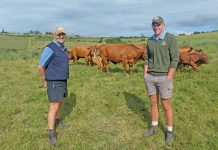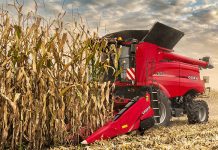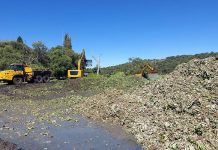Johannes Möller is a sheep and vine farmer from Keimoes, Northern Cape, and has been farming since July 1982 (26 years). In November 1982 he became chairperson of the local farmer’s union and in 2005 was elected deputy president of Agri SA in 2005.
At the recent Agri SA congress, Johannes Möller was elected as the new president. Rudi Massyn spoke to him about the challenges of unifying the various farming organisations, as well as Agri SA’s role in the future.
WHAT DO YOU HOPE TO achieve as president of Agri SA?
Firstly, to increase the number of our members and secondly, to make sure that Agri SA plays a more prominent role internationally. Do political concerns take up too much of Agri SA’s time, if one considers all the important trade issues that also need attention? It would be great if politics didn’t take up any of our time, but we are a young democracy and it’s to be expected. Hopefully, in the future, we’ll be able to focus more on economic issues.
What can be done about the creeping expropriation experienced by farmers in the form of the Communal Land Rights Bill among others?
Agri SA has become the custodian of land reform, which is a positive development and I think that in the future, when things happen, we should take a firmer stand. And if we have to get more involved in class actions, for example, then so be it.
Government hasn’t managed to establish an emerging farming class and it doesn’t seem as if it ever will, as Agriculture and Land Affairs Minister Lulama Xingwana admitted at the congress. Are you concerned and if so, what are you doing about it?
We believe that more has to be done. Agri SA has over 100 projects that support emerging farmers and there are also many individual farmers that are doing a lot to support developing farmers. I think the government has realised there’s no quick-fix solution. In agriculture it’s easier to fail at something overnight than it is to succeed.
Seeing that for the past 14 years we haven’t managed to sort out land reform, are we ever going to get it done?
That’s not an easy question. I think the question should rather be whether land reform can be executed successfully? And when will the new farmers be established? We’d really like to just get land reform behind us.
What is your organisation doing to influence the new grouping of ANC politicians?
We’ve already had discussions with all the political parties. In the past, we never spoke to the government as a political party, but recently our discussions with the ANC were like that so we’ll carry on in the same vein in the future.
Should farmers fear a Zuma presidency?
I don’t think so. You have to accept that from time to time there’s going to be a new president. As long as government understands the important role that agriculture plays and the positive contribution it makes to the country, it doesn’t matter who the president is.
What is Agri SA doing to assist farmers during the final phase of the implementation of the Property Rates Bill assessments?
We are providing support to our provincial affiliations and offering advice to farmers so that they can make the proper assessments.
Who would you like to see as the next agriculture minister?
Someone with a strong knowledge of agriculture, who will represent farmers in parliament. Someone who talks to us and understands the economic impact of agriculture.
Does Agri SA have contact with South African farmers who have moved to neighbouring countries like Zambia and Mozambique?
No, unfortunately we don’t have any formal contact and that’s one of the weak points in our structure. We have to start delivering services to them as well.
Are you concerned about our international borders, especially when one considers the chaos on the borders with Zimbabwe and Lesotho?
Yes, we are very concerned. It doesn’t help South Africa when foreigners come here and benefit from employment. One of the reasons we pay tax is for the protection of our population.
Do you think Agri SA is still too white?
Colour is not a major issue. At this year’s congress there were many more representatives of colour than in previous years. Also, the people coming through the ranks are the people who deserve it, no matter what their race.
Why has Kwanalu managed to get black leadership into their structures, but the other Agri SA provincial structures can’t?
We have approached emerging farmers to become more involved and they usually say one of two things. Either they’re happy with the current management or that they can’t afford to spend time away from their farms. The sugar industry has always had a strong business structure and that structure makes it easier to support developing farmers.
Why, in your opinion, don’t Agri SA, TAU SA and Nafu speak with one voice after 14 years?
Surely the problems that farmers face are all the same? Yes, the problems we face are the same but our approach is different and the mission of each organisation is different.
Do you think personalities play a role in preventing a unified voice?
Yes, personalities do play a role, but I don’t think they are the main problem. A lack of cooperation has been a factor for years and there have been many different presidents.
Why does the farming still have such a bad image?
I wish I had the answer to that. I think the misuse of the term boer is a contributing factor. In the old South Africa, policemen and military personnel were referred to as boers. Our history has played a crucial role and these perceptions take time to change.
Do you think that the communications policy document presented at the congress is sufficient to address the public relations inadequacies currently being experienced by organised agriculture?
It’s a document that changes from time to time and it will never be perfect. Agri SA is quoted, on average, three times a day in the press and building personal relationships with the press is an area we’d really like to work on. Organised agriculture is the only lobby group for farming in South Africa.
Do we need others?
Much better lobbying is definitely needed, but the problem is the lack of finance. You need special people that are employed on a full-time basis.
The lobbying that we do is what we are able to afford. Is there reason to be optimistic about farming in South Africa?
There are many reasons. One is that there’s been an increase in profit this year. Also, over the last year there has been a lot of investment in agriculture. So, yes, there are good reasons to be positive about the future of farming in South Africa. |fw








